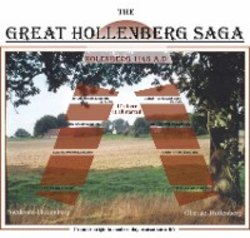Читать книгу The Great Hollenberg Saga - Heinz Niederste-Hollenberg - Страница 61
ОглавлениеThe invention of the spinning and weaving machinery brought this activity to a near halt and intensified the emi-gration across the Atlantic for this kind of workers and their families.
Another side effect of the “obligation to the landlord” was that practically all farms had to deliver local services to the community within their parish. It meant e.g. providing horse-drawn vehicles when needed to build roads or transport material and equipment. Each parish had to bear the cost for his roads. (incl.: stone-breaking, excavati-on, side-ditches etc.). The cost of those projects was distributed and billed against the farmers.
It took nearly another 100 years, after Napoleon had shaken Europe, that all those different mixtures of obliga-tions against Church and Crown could be revoked by making a one time payment in hard money (Rtlr. = Reichs-taler) to the authorities. Only now was the famer totally free to deal with his possessions at will.
The amount involved for this “Freikauf” (= payment for release) could easily go into several thousand Rtlr. which many farms had difficulties to manage. The sum of this ”payment for release” added up to a factor of 20 to 30 times of all taxes, services and some soft-historical rulings, like getting marriage permission from the landlord.
Thus and in total, it was a chance – even a costly one – for the family farms in our region to free themsenves of those obligations of serfdom which had been levied upon them throughout the feudalistic period in the Middle Ages.
Some details of the two Hollenbergs in the locality of Hambüren, taken from the same register in 1770 A.D. are presented below:
Now the two names had been firmly established:
---- Niederste Hollenberg
---- Oberste Hollenberg
The size and other particulars oft the two Hollenberg estates are around 1770 A.D. as follows:
---- Stephan or Oberste Hollenberg --- (around 1770 A.D.)
Size oft he farm: 265 Scheffel, 34 Ruten, 1,5 Fuß.
Livestock: 8 cows.
Payments to the „Tithe“ owner: (= King of Prussia): 98 Rtlr., 9 Ggr., 11 Pfg.
Plus: 1 “ Leibzucht” = small house or hut where a farmer was allowed to spent his retirement.
Plus: 2 “Heuerhaus” = small house or hut with a minor lot of land which was rented to families of Farm laborers.
